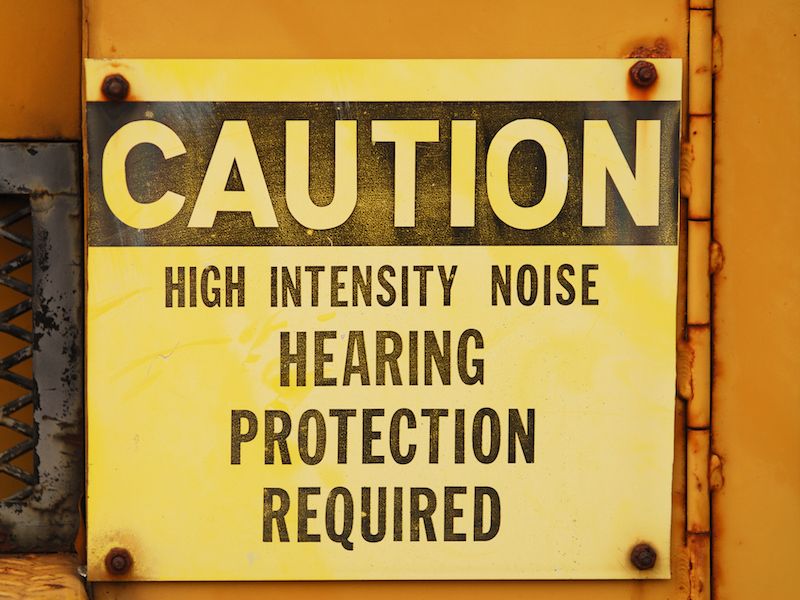
It’s one thing to know that you need to safeguard your hearing. Recognizing when to safeguard your ears is a different story. It’s not as simple as, for example, knowing when to use sunscreen. (Are you going outside? Is the sun out? You should be using sunblock.) Even knowing when you need eye protection is simpler (Using a hammer? Cutting some wood or working with dangerous chemicals? Wear eye protection).
With regards to when to use hearing protection, there seems to be a large grey area which can be risky. Frequently, we’ll defer to our normal tendency to avoid hearing protection unless we’re given information that a specific activity or place is hazardous.
Evaluating The Risks
In general, we’re not very good at assessing risk, especially when it comes to something as intangible as damage to the ears or the risk of lasting sensorineural hearing loss. Here are some examples to prove the point:
- A very loud rock concert is attended by person A. The concert lasts approximately 3 hours.
- A landscaping business is run by person B. She spends a considerable amount of time mowing lawns, then goes home to a quiet house and reads a book.
- Person C works in an office.
You may presume that person A (let’s call her Ann, to be a little less formal) might be in more hearing danger. For most of the next day, her ears will still be ringing from the loud concert. Assuming Ann’s activity was hazardous to her ears would be reasonable.
Person B (let’s call her Betty), on the other hand, is exposed to less noise. There’s no ringing in her ears. So her ears must be less hazardous, right? Not really. Because Betty is mowing every day. Actually, the damage accumulates a little at a time despite the fact that they don’t ring out. If experienced too often, even moderately loud noises can have a negative affect on your ears.
What’s occurring with person C (let’s call her Chris) is even harder to make sense of. Lawnmowers come with instructions that indicate the dangers of continued exposure to noise. But even though Chris works in a quiet office, she has a very noisy, hour-long commute every day on the train. Also, although she works at her desk all day, she listens to her music through earbuds. Does she need to give some thought to protection?
When You Should Worry About Safeguarding Your Ears
Generally, you need to turn down the volume if you have to shout to be heard. And if your surroundings are that loud, you should think about wearing earplugs or earmuffs.
If you want to think about this a little more clinically, you should use 85dB as your limit. Sounds above 85dB have the capacity to result in injury over time, so you should think about using ear protection in those situations.
Many hearing specialists advise using a specialized app to keep track of noise levels so you will be cognizant of when the 85dB has been reached. You will be able to take the required steps to safeguard your hearing because these apps will inform you when the noise is reaching a harmful level.
A Few Examples
Your phone might not be with you anywhere you go even if you do download the app. So we may develop a good standard with a couple of examples of when to safeguard our ears. Here we go:
- Operating Power Tools: You understand that working all day at your factory job will necessitate ear protection. But what if you’re just puttering around your garage all day? Even if it’s only a hobby, hearing specialists recommend wearing hearing protection if you’re utilizing power equipment.
- Listening to music with earbuds. This one calls for caution, not protection. Whether your music is going directly into your ears, how loud it’s playing, and how long you’re listening to it are all things you should give consideration to. Noise-canceling headphones are a smart choice to avoid having to turn the volume way up.
- Residential Chores: We already mentioned how something as basic as mowing the lawn, when done frequently, can necessitate hearing protection. Chores, like mowing, are probably something you don’t even think about, but they can result in hearing impairment.
- Driving & Commuting: Do you drive for Lyft or Uber? Or maybe you’re riding a subway after waiting for a little while downtown. The noise of living in a city is bad enough for your hearing, not to mention the added injury caused by cranking up your music to drown out the city noise.
- Exercise: You know your morning cycling class? Or maybe your nighttime yoga session? You may consider using hearing protection to each. Those instructors who use microphones and sound systems (and loud music) to motivate you may be good for your heart rate, but all that loudness is bad for your hearing.
These examples might give you a suitable baseline. When in doubt, however, you should defer to protection. Compared to leaving your ears exposed to future injury, in most circumstances, it’s better to protect your hearing. If you want to be able to hear tomorrow, protect today.